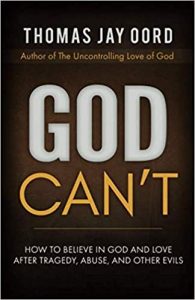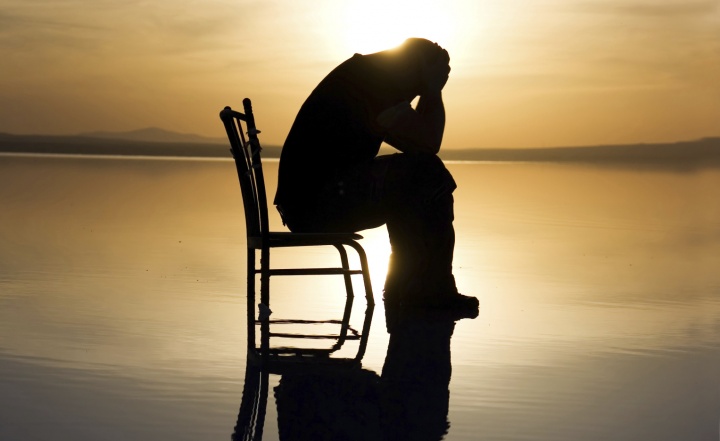In his book, God Can’t: How to Believe in God and Love after Tragedy, Abuse, and Other Evils, Thomas Jay Oord delves into the heart of one of the most difficult questions Christians face, an issue that theologians have wrestled with for centuries: Why does an all powerful and loving God allow tragedy, abuse, and suffering? With insight and compassion, he uses real life examples and testimony combined with groundbreaking ideas to challenge conventional wisdom on this difficult subject.
Written in straightforward language, this book will be of great comfort not only to victims of assault and survivors of disasters, but to anyone dissatisfied with unconvincing explanations of God’s complicity or control of terrible events.
Whether or not you agree with everything the author proposes, God Can’t has much to recommend and will provide plenty of food for thought. Oord starts the book with a real-life tragedy cutting straight to the pat answers normally given for such events, like “There’s a higher purpose,” or “We can’t understand God’s ways.”
He reels off a list of genuine evils and explains the audience for his book: anyone who wonders where God was or what he was doing when they needed him. Describing the heartbreaking stories of four people, he outlines the typical questions that we ask such as “Is God punishing me?” “Does he care?” or “Why doesn’t he prevent pointless pain?”
 Citing polls that indicate the existence of evil as the primary reason nonbelievers say they reject God, he says that even many of those who retain their beliefs intellectually after a tragedy end up practical atheists.
Citing polls that indicate the existence of evil as the primary reason nonbelievers say they reject God, he says that even many of those who retain their beliefs intellectually after a tragedy end up practical atheists.
He proposes what he calls “a real solution” consisting of five ideas that are based on two assumptions. The first assumption is that God always loves and does not ever use evil as a form of tough love. The second is that sometimes we experience genuine evil — something that happens where there is clearly no benefit and where it would obviously have been better that it never happened. Our intuition of what is good and evil is the same as God’s.
The first of the five beliefs will challenge the preconceived notions of many readers. It is that God can’t prevent evil on his own. If God could and doesn’t, then he is culpable. Knowing that Christ “offers the clearest portrayal of God’s love,” can we imagine Jesus standing idly by while a woman is molested right in front of Him?
Realizing that the Son would intervene leaves us with a major problem: “Why can’t a powerful and loving God prevent evil?” To answer this, the author highlights Bible verses that show things God cannot do such as grow tired or lie. Quoting C.S. Lewis, he says “Not even Omnipotence can do what is self-contradictory.”
He briefly delves into biblical interpretation to emphasize that the majority witness defines love as “to act intentionally…to promote overall well-being.” Since love is intrinsic to God’s nature and that nature shapes what he can do, God cannot control others because removing freedom would be to contrary to love, and “God cannot deny Himself.”
Another important reason Oord gives as to why God cannot unilaterally stop evil is that he does not have a body with which to intervene — except when “specially incarnated in Jesus.” Instead, he must rely on influencing but not controlling his creatures, which opens the startling possibility that God can try but fail to save a person from tragedy.
The second of the five ideas is that God always empathizes with our pain, feeling the full extent of what we feel and responding with “resilient hope.” God is not absent or preoccupied with his vision. But neither is God unmoved or pulling every string. And God certainly isn’t so appalled by our sin that he won’t associate with us. Instead, we must look to Jesus’ crucifixion and see a God that stands shoulder to shoulder with us.
However, we must remember that if all God does is suffer with us while having the power to intervene, then he would not be perfectly loving. This is why this idea must be combined with the first one — that God needs willing helpers to combat evil. In a similar vein, God’s love often reaches us through intermediaries such as family, therapists, or communities of faith or even art, music, or the natural world.
Along with Oord’s three other revolutionary ideas, readers are challenged to address their fears of God and of what God might do to us if we truly accepted that he loves us. As Oord states, “The uncontrolling God of love empowers and inspires us to live lives of love!”
Believing that God is controlling doesn’t make the world any safer or us any more protected. Knowing that God does not want us to suffer, but cannot singlehandedly prevent it, but that he is asking for cooperation from everyone and everything at every moment reassures us that God truly cares for us — and that what we do, no matter how small, really matters.

